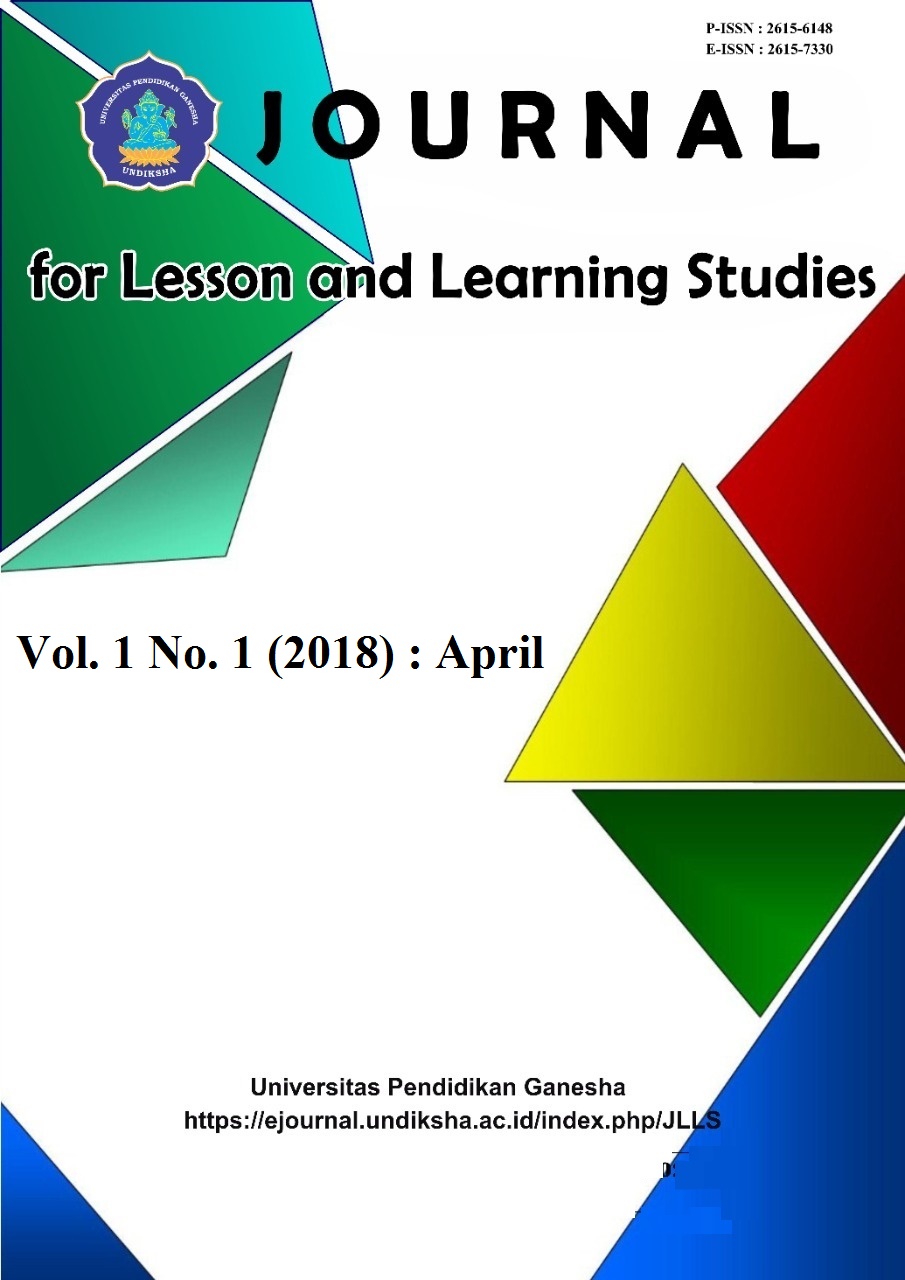HUBUNGAN ANTARA MINAT MEMBACA DENGAN KETERAMPILAN MENULIS CERITA PENDEK SISWA KELAS V SD GUGUS VII MENGWI TAHUN AJARAN 2017/2018
DOI:
https://doi.org/10.23887/jlls.v1i1.14626Abstract
This research aims to determine the significant relationship between reading interest with the skills of short story writing of 5th grade students of elementary school in Gugus VII Mengwi, academic year 2017/2018. This research was ex pos facto, correlational research. The population of this research was the entire 5th grade elementary students in Gugus VII Mengwi academic year 2017/2018 which amounted to 186 students. Sample determinated using proportional random sampling technique with 5% error rate so that the number of samples obtained from the population was 123 students. Interest reading data was collected by giving a questionnaire to the research sample, while the data of short story writing skill was obtained from the description test. As a prerequisite test was the normality test of data distribution. After the prerequisite test is met, and the normal distributed data statistical analysis used in this research was the product moment correlation analysis technique. Based on data analysis obtained thitung = 0,480, while at 5% significant level with n = 123, then the value obtained ttabel = 0,176. Because thitung>ttabel then the null hypothesis (H0) that states there is no significant relationship between reading interest whit the skills of short story writing of 5th grade students of elementary school in Gugus VII Mengwi academic year 2017/2018 rejected and the alternative hypothesis (Ha) accepted. In conclusion, there was a significant relationship with a weak level relationships and occurred in the form of a positive relationship between reading interest with short story writing skill of 5th grade students of elementary school in Gugus VII Mengwi academic year 2017/2018.
References
Penggunaan Media Film Animasi Terhadap Keterampilan Menulis Karangan Narasi Siswa Kelas V SD”. Jurnal Prima Edukasia, Vol. 2, No. 2 (hlm. 251-253). Tersedia pada https://id.scribd.com/doc/200816283/1. Diakses pada 20 Januari 2018.
Dalman, H. 2013. Keterampilan Membaca. Jakarta: PT Rajagrafindo Persada.
Dalman, H.2016. Keterampilan Menulis. Jakarta: PT Rajagrafindo Persada.
Emzir. 2015. Metodologi Penelitian Pendidikan: Kuantitatif dan Kualitatif. Jakarta: PT RajaGrafindo Persada.
Maryuningsih. 2014. Hubungan Antara Minat Membaca dengan Keterampilan Menulis Narasi Siswa Kelas IV se-Gugus Kecamatan Kraton Yogyakarta Tahun Ajaran 2013/2014. Yogyakarta: UNY. Tersedia pada https://www.neliti.com/id/publications/135044/hubungan-minat-baca-dengan-keterampilan-menulis-narasi-siswa-kelas-V . Diakses pada tanggal 20 Januari 2018.
Nurgiyantoro, Burhan. 2012. Penilaian Pembelajaran Bahasa Berbasis Kompetensi. Yogyakarta: BPFE
Nurhadi. 2016. Teknik Membaca. Jakarta: PT Bumi Aksara
Setyosari, Punaji. 2015. Metode Penelitian Pendidikan dan Pengembangan. Jakarta: Kencana .
Sugiyono. 2015. Metode Penelitian Pendidikan Pendekatan Kuantitaif, Kualitatif, dan R&D. Bandung: Alfabeta
Sukardi. 2016. Metodologi Penelitian Pendidikan. Jakarta: PT Bumi Aksara.
Tarigan 2015. Membaca sebagai Suatu Keterampilan Berbahasa. Bandung: CV Angkasa.
Tim Redaksi. 2001. Kamus Besar Bahasa Indonesia. Pusat Bahasa Depdiknas
Downloads
Published
How to Cite
Issue
Section
License
Authors who publish with the Journal for Lesson and Learning Studies agree to the following terms:
- Authors retain copyright and grant the journal the right of first publication with the work simultaneously licensed under a Creative Commons Attribution License (CC BY-SA 4.0) that allows others to share the work with an acknowledgment of the work's authorship and initial publication in this journal.
- Authors are able to enter into separate, additional contractual arrangements for the non-exclusive distribution of the journal's published version of the work (e.g., post it to an institutional repository or publish it in a book), with an acknowledgment of its initial publication in this journal.
- Authors are permitted and encouraged to post their work online (e.g., in institutional repositories or on their website) prior to and during the submission process, as it can lead to productive exchanges, as well as earlier and greater citation of published work. (See The Effect of Open Access)




